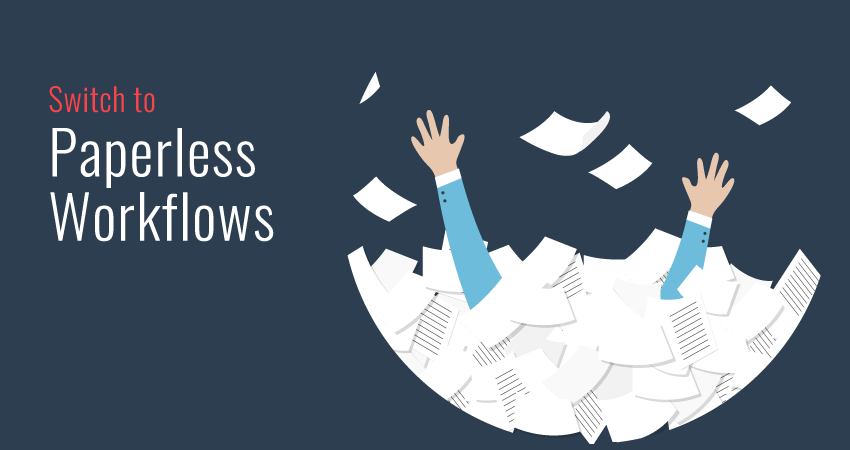It’s time to do something radical with your financial department. Email threads are taking too long and you’ve run out of space to store paper forms. It takes hours to find the status of invoice approval and employees are complaining about errors in their reimbursements.

You’ve felt the need to go paperless workflows for a while, but you are worried about how hard the transition will be.
Learn 5 compelling reasons to switch to paperless workflows with workflow software for enterprises.
Below are the reasons to switch to paperless workflows.
1. Mistakes Minimized
The most compelling reason for a shift to paperless workflows is a reduction in errors. From unvalidated data to illegible writing to incomplete forms, paper-based forms have lots of opportunity for errors.
And when mistakes happen in a workflow, blame is immediately assigned to everyone except where it belongs – the workflow itself! When forms and flows are ambiguous, mistakes turn people against each other. When you use a paperless workflow solution, you can train everyone to think about how to make improvements to the system, rather than turning on each other.
2. Instant and Controlled Accessibility
Imagine having a form for a purchase order process available at your fingertips. And also having the ability to call up any request and see the status instantly. That’s what a paperless online purchase order software can do for you when you add automation. No more sending someone diving through filing cabinets to call up information.
But you probably don’t want everyone to have access to the same information. For example, you might be dealing with sensitive financial information that not everyone on your team needs to know about.
With an automated paperless purchase order system, you have lots of options when restricting data. You can hide data fields, make them read-only, or hide the process altogether.
Take your first step to
3. Compliance Made Easy
Auditing your process gets a lot easier when you’re not trying to dig into tons of incomplete or missing paperwork pulled out of storage last minute. Get a handle on important contracts and documents without having a physical trail of mountains of paperwork.
With restricted access to confidential information in digital files and folders, you have documented safeguards put in place that help you check off the mandated requirements for industry-specific regulations like HIPAA, SOX, ISO, or PCI DSS. With a transparent digital record of supporting documents to all your processes, you can simplify complying with government and industry regulations and ensure your documents meet compliance specifications. This way, there’s no need to go hunting for documents when review time rolls around.
4. Better Security
In today’s world, where is the most secure place a document can live? Stored in a desk drawer with a lock, or on the most sophisticated cloud workflow software platform? When you consider the risks of theft, natural disasters, fire, flood, and endless other possibilities, the safe bet to make your processes anti-fragile is to use the most advanced systems there are. With paperless systems in place, you’re guaranteed improved security and with data backed up, and infinite data recovery options in the event of a disaster.
5. Super Savings
From an operational standpoint, space is almost always at a premium. Storage costs are a major expense second in cost only to salaries in most large cities. In addition, if you pile on the cost of paper, office supplies, printers, hardware, shipping and mailing not to mention the maintenance of all of this you realize just how much you could be saving by putting paperless office software to use.
Having an electronic storage system with scanned secure files eliminates the need for excessive storage space and keeps all your files in one secure location. Not only do you save space that you can now use more optimally but you also accrue subsequent savings in operation costs and time (that you save not manually looking for where something was last stored as well as on running around following a paper trail around the office for the relevant process approvals).
Also, according to the U.S. Environmental Protection Agency, getting rid of paper can save as much as $80 per employee.
Bonus: Better Environmental Impact
The EPA also estimates that the average office goes through 10,000 sheets of paper per year. That’s three-quarters of an acre of pine forest that could be saved each year!
So what more do you need to try out a paperless workflow? Take a free trial of Kissflow Workflow and see what you can do!



